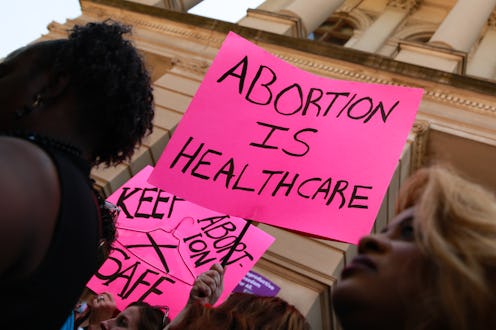News
A UN Official Just Equated U.S. Abortion Bans To "Torture" In A Sharp Warning

In recent months, lawmakers in several states have passed a series of draconian restrictions on abortion, including a near-complete ban on the procedure in Alabama. In an interview with the Guardian, a United Nations High Commissioner on Human Rights said that the U.S. abortion bans are clearly "torture," and amount to a human rights violation.
“We have not called it out in the same way we have other forms of extremist hate, but this is gender-based violence against women, no question,” Kate Gilmore, the UN's deputy high commissioner for human rights, told the Guardian. “It’s clear it’s torture – it’s a deprivation of a right to health.”
Gilmore said that the UN committee tasked with monitoring the implementation of the the nine core UN human rights instruments have all separately concluded that “the absolute prohibition of abortion ... is against human rights." She also noted that restrictions on abortion disproportionately harm marginalized women.
“We have to stand with the evidence and facts and in solidarity with women, and in particular young women and minority women who are really under the gun," Gilmore said. "This doesn’t affect well-off women in the same way as women with no resources, or able-bodied women the way it affects disabled women, and urban women the way it affects rural women."
In May, Alabama passed a law that bans abortion at any point after conception, with no exceptions for rape or incest. Several other states have passed restrictions on abortion in recent months as well, including six-week bans in Ohio, Georgia, Missouri, Louisiana, and elsewhere. Most of those laws are currently being challenged in the courts and haven't taken effect yet.
Many organizations, including the Guttmacher Institute, The Bixby Center for Global Reproductive Health at the University of California San Francisco, the World Health Organization, and Amnesty International have stressed that criminalizing abortion does not reduce the number of abortions in any given jurisdiction — it only makes the procedure more dangerous. The Guttmacher Institute notes that, on a per capita basis, abortions are slightly more common in countries that have banned it altogether: The abortion rate in countries with outright prohibitions on the procedure is 37 out of 10,000 women, while in countries that allow abortion with no restrictions, that rate is 34 out of 10,000 women, according to Guttmacher.
Gilmore told the Guardian that groups fighting to restrict abortion access are waging "an assault on truth, science and universal values and norms." She also noted that, although the UN's determination regarding abortion is not binding, it could play a role in future court rulings regarding the legality of abortion bans like Alabama's.
“The human rights system [of the UN] doesn’t have an army, but what we know is many national courts follow that jurisprudence in their own rulings,” she said. “It builds up a body of law.”
If you'd like to help the women in Alabama who will be affected by the state's abortion ban, here are some ways you can do so.